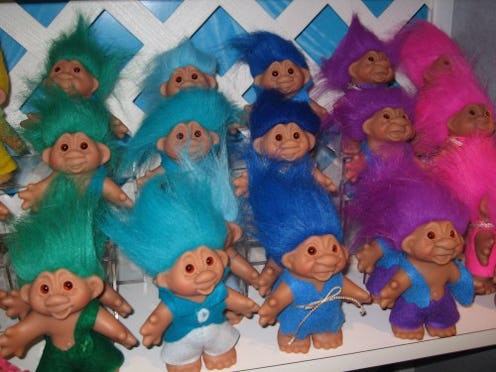Life
How Not To Deal With Cyber-Harassment

Earlier this summer, British journalist Caroline Criado-Perez endured tremendous online abuse as a result of her feminist-minded activism. In a speech yesterday, she explained why persecuting harassment should not be considered a free speech assault and how the phrase "don't feed the trolls" only contributes to the problem.
"If there’s one thing I want to come out of what happened to me, it’s for the phrase “don’t feed the trolls” to be scrubbed from the annals of received wisdom," Criado-Perez told attendees of the Women's Aid 'Cyber Stalking & Harassment Conference.'
"I can’t begin to tell you how much I hate that phrase. That phrase takes no account of the feelings of the victim — only of the feelings of a society that doesn’t care, that doesn’t want to hear it, that wants women to put up and shut up. It completely ignores the actions of the abuser, focusing only on the actions of the victim — because that’s what we do in this society. We police victims. We ask “why doesn’t she leave?” instead of asking “why doesn’t he stop?”
In July, Criado-Perez was targeted for harassment after her campaign to get more women's images on British banknotes proved successful. The Governor of the Bank of England announced that Jane Austen will mark £10 notes starting in 2017.
I remember hearing out of context about the abuse Criado-Perez faced earlier this summer. Reading up on it now, I can't believe its root was something as seemingly inconsequential as the changing face of one British banknote. But I guess that's part of the issue — the fact that it doesn't matter what the issue is. If you're a male public figure, people disagree by debating your ideas; if you're a female public figure, people disagree by threatening to rape you.
From comments like "wouldn’t mind tying this bitch to my stove" to overt, graphic threats of violence, Criado-Perez was inundated with hateful, hysteric tweets. Some of them were remarkably specific, such as: "A car bomb will go off outside your house at 11:40pm. I will be watching you to make sure it does." People began stalking her online, creating new Twitter accounts when old ones got deleted and commenting on any blogs she did. They dug up and publicized personal details, such as her family members' names and even what they believed to be her home address.
When Criado-Perez spoke up about this, the response was predictable. She was accused of being whiny, taking things too seriously and, of course, "feeding the trolls." In her speech yesterday, Criado-Perez elaborated on how this phrase is so insidiously victim-blaming.
Not feeding the trolls doesn’t magically scrub out the image in your head of being told you’ll be gang-raped till you die. What are victims meant to do with that image, the rage and the horror that it conjures up? We’re meant to internalise it until it consumes us? Well I’m sorry, but I’m not having that.
So Criado-Perez calls on social media companies like Twitter to make reporting and eradicating abuse easier; for law enforcement to better respond to hate speech and harassment online. Perhaps most importantly, she calls for all of us to change our attitudes. "Victims have to be allowed to stand up and shout back — they need to be allowed to ask for support, without being accused of attention-seeking," she said.
And to those who call this support an assault on free speech? Criado-Perez scoffs.
This is their freedom of speech. They have a right to contact me, a private person, not an MP, not a company, any time they want. They can email me, they can tweet me, they can write to me, they can be as abusive as they want, just so long as they don’t directly threaten me. And there’s nothing I can do. Well, I say no to that too.I want my freedom of speech back. And if we stand together and keep shouting back, I believe we’ll get it.
You can read Criado-Perez' whole speech here.
Photo: Stuff From Our Toybox